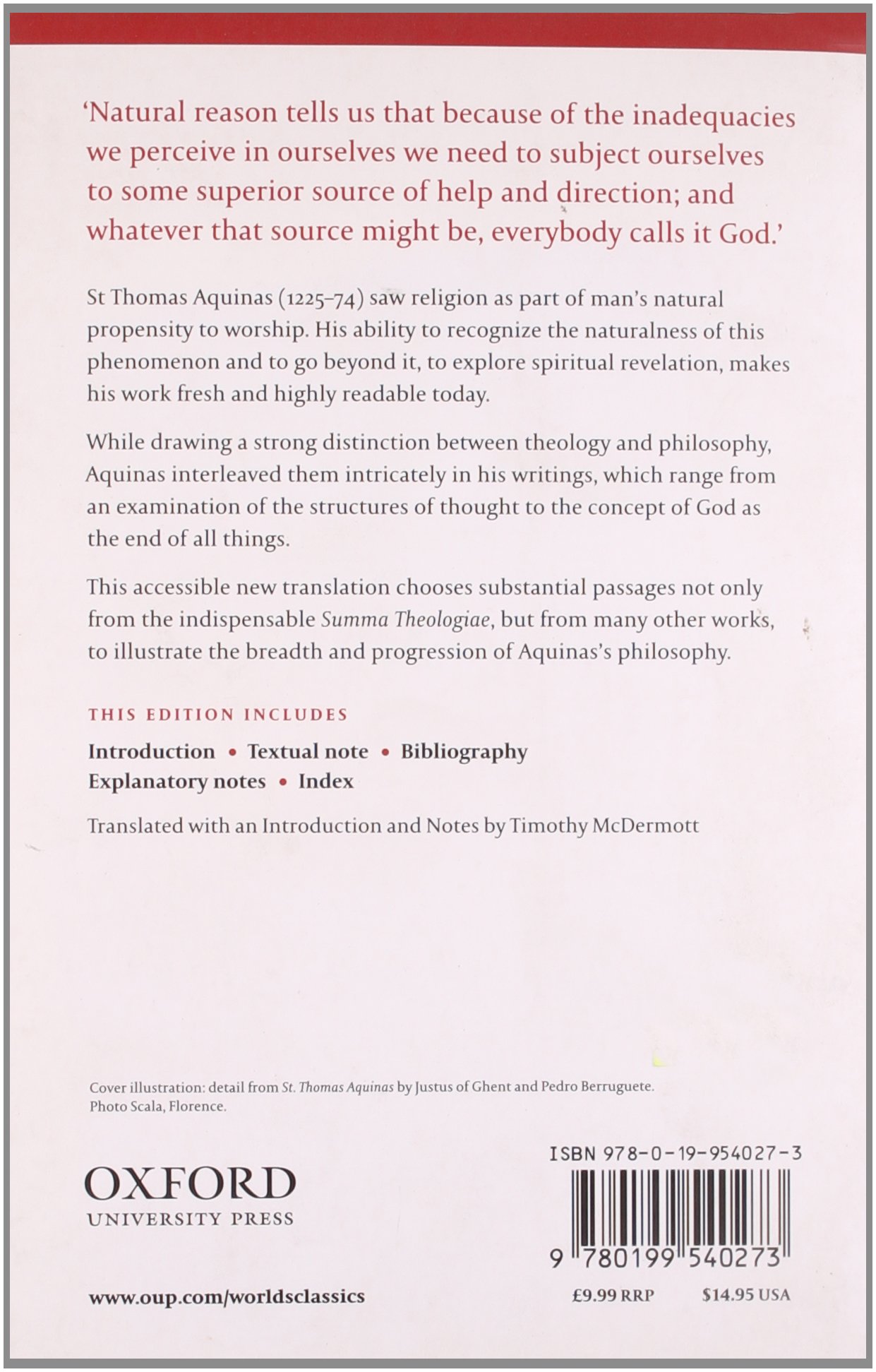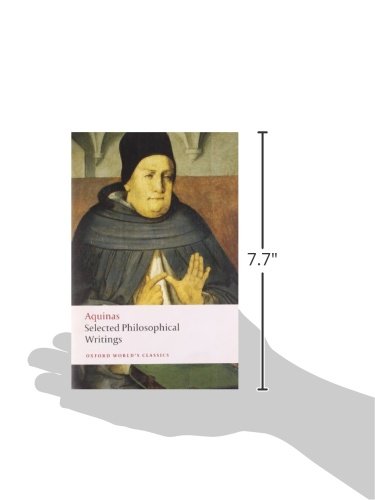



Selected Philosophical Writings (Oxford World's Classics)
L**E
Great for Theology Beginners and Aquinas Lovers! Great translation and numerous resources inside the book!
This is a great collection of philosophical writings by Thomas Aquinas.Some things I really enjoyed about this collection in particular is that it is arranged in a way that every passage builds on the previous, connecting them, which is magnificent seeing as they are from all his different writing collections, like Summa Theologica, Summa Gentiles, Malo, and so on. Being able to connect one reading from Summa Theologica to the next one from Malo is absolutely brilliant!The translation was also amazing, as it really kept the true essence of Aquinas while still keeping it sensical.I have to say, I was thrilled by this. It is great for introductory theology classes, or if you just have a passion for Aquinas but do not know where to start.It also has an index, notes, and many other helpful resources in the book to help guide your understanding of the reading.Altogether, I would highly recommend it.
J**E
Good for Christian philosophy
I'm a staunch protestant of the reformed tradition with a great interest in Christian philosophy. Aquinas coupled with augustine, anselm and Calvin is a great thinker.
G**N
great Aquinas starting point
This book packs a lot of material. As an anthology, as the other reviewer has ably mentioned, this is wonderful. This book would be extremely useful to the student of Christian theology (Roman Catholic or Protestant) or to the student of historical philosophy. If you are studying the works of Aquinas for history, a few words of caution. A lot of his philosophy is based on Aristotle. If you do not understand basic Aristotle, this can be painful at times. "Actualize" and "potential" and sufficient causes, etc. will appear a lot. If you are unfamiliar with what this terminology means, you will have slow going. This is just a problem with some philosophy. Kant, another member of the big-5 team of greatest philosophers, also suffers from a language barrier to modern readers. But like Kant, you can still get a lot out of it.The editor of this book has put in a lot of useful and wonderful theology of Aquinas. This is good b/c not many people believe in his metaphysics anymore. So his theology may have more modern usefullness. Given his influence over Western Christianity and Roman Catholicism in particular, Aquinas is definitely worth the read. One of the small gems (and unexpected) was a part of Aquinas' commentary on I Cor. 15. Sections on the Problem of Evil are in here as well. I was surprised, but glad, to see that the editor left in a section on the problem of using language to describe God. This was a typical 20th century problem. It's good to see that there aren't many new philosophical problems.If you are just getting into Aquinas (and you have some background in philosophy) this is a good place to start. If you are interested in theology, there is much in here for you as well. Given the structure of the book, you do not have to read straight through.
G**G
Reasonable introduction to the angelic doctor
St Thomas Aquinas's entire corpus is immense and fills several shelves on a bookcase. The Summa Theologica alone is usually contained in three to five massive pages.Aquinas is the most brilliant of the medieval philosophers who tried to reconcile 'faith' and 'reason' in the Christian tradition. Even today, he is extremely important in Catholic scholasticism (in its revived forms) and in many areas of Christian theology. Much of Catholic Church dogma still relies on Aquinas (he is probably the most quoted philosopher in the Catcheism, along with Augustine).He is also well worth studying in his own right. His discussions of God, the universe, the ethical good and virtues are still of interest today. His thought also influenced other great medieval thinkers, including Eckhart and Nicholas of Cusa.While much of the angelic doctor's speculations about angels and demons and about realities beyond our sense experience may seem to make little sense in our skeptical era, his system contains profound and original thought often argued with considerable creativity and genius. The sheer scope of his interests combined with a passionate and sincere spirituality make him by far one of the most appealing of great Christian thinkers.Unfortunately Aquinas has been associated with decadent scholasticism but Aquinas had a healthy and critical mind (given the historical context), a very acute ability to understand philosophical concepts, and he was an original thinker able to bring insights and arguments of his own to a problem.While I believe in some respects Aquinas's conception of God as Being is flawed, modern theology can still gain much from carefully studying Aquinas.
Z**R
A very generous selection
Although the selection is huge, more than other compilations, many selected texts are not what I was expected. I think that there are texts more important and insightful. However, for the price, it is worth it to have it.
C**.
St. Thomas for Beginners
The best way to know the thought of a great thinker is to read what he wrote rather than what others wrote about what they think he wrote. For St. Thomas, to learn about the world is to take a peek into the mind of God. The collection of texts in this book give a great sense of what he thought about our world, its structure and our place in it. Just enough to whet your appetite for more.
Trustpilot
2 weeks ago
2 months ago